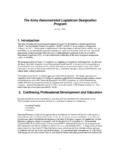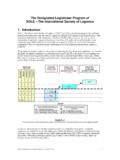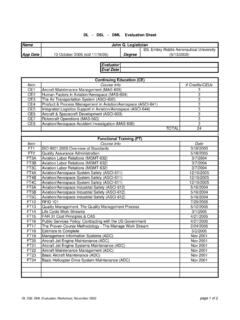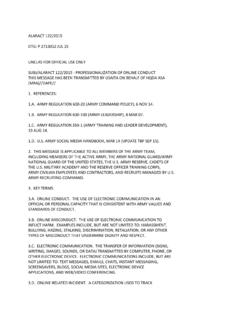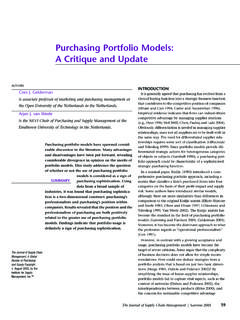Transcription of Logistics Management Professionalization Guide
1 SOLE The International Society of Logistics Logistics Management Professionalization Guide A Guide to Developing the Professional Logistician in Industry and Government Throughout the World 1. SECTION 1 INTRODUCTION ..3. INTRODUCTION ..3. SCOPE ..3. REFERENCES ..3. STUDENT EVALUATION AND COMPETENCIES ..3. CONTINUING EDUCATION UNITS (CEUS) ..4. SECTION 2 FOUNDATION GENERAL ..5. METHOD OF INSTRUCTION ..5. MATHEMATICS ..5. RELIABILITY ..5. HUMAN FACTORS ..5. QUALITY SIX SIGMA - LEAN ..6. Management & LEADERSHIP ..6. ENGINEERING ECONOMY AND LIFE-CYCLE COST ANALYSIS ..6. SECTION 3 PROFESSIONAL DEVELOPMENT TRAINING ..7. GENERAL ..7. METHOD OF INSTRUCTION ..7. PROGRAM SYSTEM DESIGN ..8. PRODUCTION AND DEPLOYMENT.
2 9. SUSTAINMENT AND CUSTOMER SERVICE ..10. SECTION 4 DEVELOPING INDIVIDUAL SKILL AREAS ..11. GENERAL ..11. SUPPLY CHAIN OPERATIONS ..11. RELIABILITY, MAINTAINABILITY AND SUPPORTABILITY ..11. GENERAL Logistics TRAINING ..11. SECTION 5 UNITED STATES DEPARTMENT OF DEFENSE EDUCATIONAL OPPORTUNITIES IN. Logistics ..12. DEFENSE ACQUISITION UNIVERSITY ..12. AIR FORCE INSTITUTE OF TECHNOLOGY (AFIT) ..12. ARMY Logistics Management COLLEGE (ALMC) ..12. SECTION 6 Logistics -- SELECTED BIBLIOGRAPHY ..13. Logistics , SUPPLY CHAIN Management , AND SUPPORTABILITY ..13. SYSTEMS, SYSTEMS ANALYSIS, AND SYSTEMS ENGINEERING ..15. CONCURRENT AND SIMULTANEOUS ENGINEERING ..16. SOFTWARE AND COMPUTER-AIDED SYSTEMS.
3 16. RELIABILITY ENGINEERING ..17. MAINTAINABILITY ENGINEERING AND MAINTENANCE ..18. HUMAN FACTORS AND SAFETY ENGINEERING ..18. PRODUCTION, MANUFACTURING, QUALITY CONTROL AND ASSURANCE ..19. OPERATIONS RESEARCH AND OPERATIONS Management ..20. ENGINEERING ECONOMY AND LIFE-CYCLE COST ANALYSIS ..21. Management AND SUPPORTING AREAS ..21. 2. Section 1 Introduction Introduction Logistics , as with all professions, maintains a distinct standard of performance and knowledge based on academic and industry requirements. For the Acquisition and Sustainment Logisticians in Industry and Governments throughout the world, this is currently the Certified Professional Logistician (CPL) program offered by SOLE The International Society of Logistics .
4 The CPL provides a standard and benchmark on which to base all training for the logistician, coupling the knowledge requirement with a demonstrated competency. The certification is a laudable goal, and may be achieved at the completion of training; but this is not the purpose of this training program. The training outline presented within this Logistics Management Professionalization Program is focused on the development of the individual logistician skill competencies to support professional performance with a solid foundation in knowledge. Scope This program covers the fundamental elements of Logistics in four major program areas: Program Management , System Development, Production and Deployment, and Sustainment.
5 It covers these areas using standard academic texts in a manner similar to an academic course presentation, where the texts form the basis for the training, and individual texts cover more than one of the course areas. This is not to say that the training for logisticians ends with the program presented here. Training is a journey, not a destination and continued professional development demands continued training. Students are encouraged to continue their individual development through education in their specialty fields and expand into additional fields as opportunities present themselves. References Available academic texts are used as references throughout this course. Substitution by an individual instructor is encouraged to meet local text availability, as long as both the technical content and the hours spent in local class participation are maintained.
6 Student Evaluation and Competencies Classes for this program are based on the individual students having a solid educational foundation, to include attainment of a Bachelors Degree and a minimum of four years experience in the field of Logistics . Students with less than this education and experience may participate in the training; however, the instructors will have to adjust the course hours to reflect additional training requirements to compensate for the additional knowledge requirements. Completion of the courses provides a solid foundation for sitting for the CPL exam. However, it is not a guarantee of passing the exam since the exam itself is a comprehensive one covering more than is covered in this course.
7 3. Continuing Education Units (CEUs). Continuing education units may be awarded based on the length of each course in class contact hours. One CEU is awarded for each 10 hours of class contact hours. These are awarded through SOLE based on the approval of the course conduct, content and instructor by SOLE. prior to the course presentation. Instructors should contact SOLE prior to the course for full information on the CEU program, record keeping and other approval requirements. 4. Section 2 Foundation Competencies General The subjects listed in this section are those critical skills and knowledge that are needed to fully prepare the logisticians to successfully perform their individual tasks.
8 Although some text references are listed for information in these areas, others may be equally applicable for use in these basic areas. It is incumbent upon the instructor to select available training materials and texts based on the knowledge and background of the students. A more comprehensive bibliography is contained in Section 6 of this document and covers additional text books and references that may be applied in selected fields. Method of Instruction There are no formal methods of instruction recommended for the subjects in this area of the plan. These should be structured to meet the needs of individual logisticians. A typical presentation may consist of a series of lunch time discussions or presentations and discussions at Chapter meetings of SOLE.
9 Mathematics Frohne, Philip T., CPL, Quantitative Measures of Logistics , SOLE The International Society of Logistics Smith, Dr. Caroline, Statistics for Logisticians, SOLE The International Society of Logistics Knezevic, Dr. Jezdimir, Probabilistic Elements of Reliability Maintainability and Supportability, SOLE - The International Society of Logistics Reliability Ireson, W. Grant; Coombs, Clyde F.;and Moss, Richard Y., Handbook of Reliability Engineering and Management , McGraw Hill, ISBN: 0070127506. Human Factors Woodson, Wesley E.; Tillman, Peggy; Tillman, Barry, Human Factors Design Handbook (2d Edition), McGraw Hill Professional, ISBN: 0070717680. Sanders, Mark S. and McCormick, Ernest J.
10 , Human Factors in Engineering and Design, McGraw Hill, ISBN: 007054901X. 5. Quality Six Sigma - Lean Pande, Peter S.; Neuman, Robert P.; and Cavanagh, Roland R., The Six Sigma Way: How GE, Motorola, and Other Top Companies are Honing Their Performance, McGraw Hill, ISBN: 0071358064. George, Michael L.; Rowlands, David T.; and Kastle, Bill, What Is Lean Six Sigma?, McGraw Hill, ISBN: 007142668X. Management & Leadership Rubenstein, Moshe F., and Firstenberg, Iris R.; The Minding Organization, John Wiley & Sons, Inc., ISBN: 0471347817. Harvard Business School Publications; Harvard Business Review on Leadership Sample, Steven B, The Contrarian's Guide to Leadership; Jossey-Bass, ISBN: 0787955876, Womack, James P.


